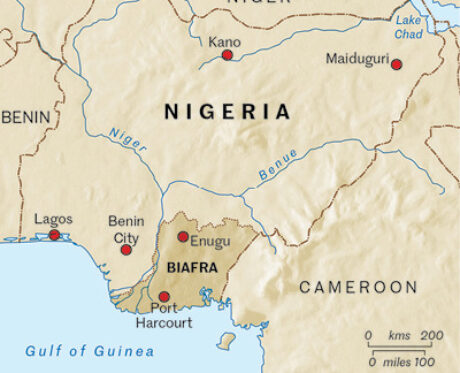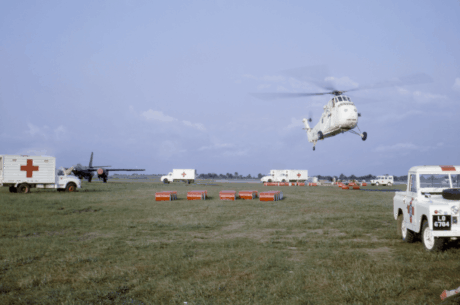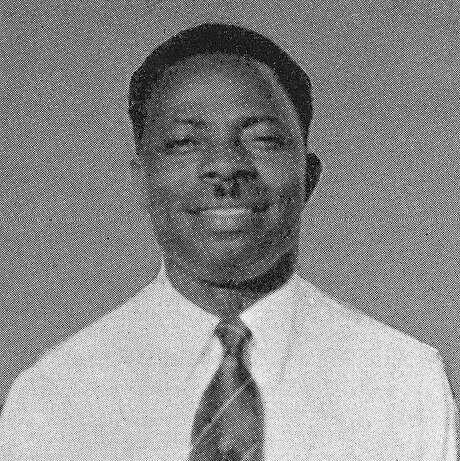
The war took the Mission somewhat off guard. I have asked missionaries of that period if they had anticipated the coming of the war, and most have said that they had not. The Qua Iboe Mission Quarterly of winter 1965 expresses happiness with the excellent progress that Nigeria was making, especially when compared to the Congo, which had just passed through the horrors of the Simba Rebellion. The QIM Quarterly subsequently expressed utter shock and surprise in January 1966, when Nigeria began to experience radical instability. Over the next 18 months there followed coups and counter coups and attacks against Igbos living in the north of Nigeria. This led, in March 1967, to the Igbo dominated Eastern Region of Nigeria declaring independence under the leadership of Lt Colonel Ojukwu. The breakaway state was known as Biafra. The Federal Government of Nigeria commenced hostilities against Biafra in July 1967, and the war that ensued continued until January 1970, when the Biafran state collapsed. It is not my intention here to discuss the rights and wrongs of the conflict – these are still bitterly disputed today and remain a source of division within Nigeria. Rather, I want to reflect upon the effect the war had on the mission and its response to the war.
By 1967 the Qua Iboe Mission Quarterly was renamed Dispatch and the first edition of 1967 notes ominous movements of displaced people within Nigeria. The Summer 1967 edition begins with a deeply sombre editorial relating that civil war had commenced and some 19 Qua Iboe Mission staff were now cut off from the outside world, trapped inside Biafra by the Federal Government forces. The late Bill Johnston, writing in Dispatch from Ochaja noted that nothing had been heard from the 19 staff in Biafra, but the Dispatch editorial noted that the Mission had no concern for their safety and that the Mission would carry on with its work and “discharge its obligations”.

The winter 1967 edition records that communication had still not been re-established and that the BBC had agreed to broadcast a special greeting to missionaries, including our QIM missionaries, for Christmas. The Dispatch of Spring 1968 relates that the Nigerian Federal forces offensive had made great inroads against Biafra and that the 19 Qua Iboe Missionaries had been taken prisoner by the government. Detained without trial in conditions of very considerable discomfort for a month, they were then repatriated in two groups, 12 arriving back in the UK on the 10th of May and the others at some point later. The annual QIM report for 1968 notes with darkly terse understatement: “…for many of our workers, this has been a bitter experience”.
Dispatch noted with sadness and distress that for the first time in the history of the mission, not a single missionary was in the Qua Iboe Field, though many others continued to work in Igala and Bassa. Much of the work of the mission and church was disrupted for a period – for example, the Bible College at Abak was severely damaged by troops, a mission house was destroyed by shell fire, the Mission printing press was destroyed – but the indigenous QIC leaders magnificently rose to the challenge of maintaining the work of the Lord under exceeding challenging circumstances.
The QIM relief fund for Nigeria brought in approximately £30,000 between 1968-70; around £8,000 in 1968, rising to £10,000+ in 1970. Today this would be worth approximately £250,000-£350,000 – an amazing sum from a small mission.

The Mission was not ready to give up its ministry in the Qua Iboe region. It sought and won permission from the Nigerian Federal and Regional governments to begin relief operations in Biafra, where a huge humanitarian crisis had been precipitated by the war. The Red Cross had estimated that by mid 1968, around 10,000 people were dying every week from starvation, setting aside those killed by military action. The Red Cross estimated that total deaths would be around 780,000 by the end of 1968 – and it is estimated that in total, well over 1 million died between 1967-70. The late Dr Derek Belgrave was seconded from QIM to the Red Cross at this time to lead relief operations, and other missionaries such as Bill Johnston were (very bravely) busy bringing medicines through the front lines to the suffering people in the south (Bill described this to me – with typical humour - as his drug running period). Many of the QIM staff were in the forefront of bringing much needed medical attention to those affected by the war. Eventually, the Mission established a dedicated relief team. In addition to this, The Qua Iboe Church (now UEC) was also very active in bringing aid to the suffering, under the leadership of Amos Udonsak.
The QIM relief fund for Nigeria brought in approximately £30,000 between 1968-70; around £8,000 in 1968, rising to £10,000+ in 1970. Today this would be worth approximately £250,000-£350,000 – an amazing sum from a small mission. The Spring 1970 Dispatch tells the remarkable story of how the Igbo QIC leaders met together for the first time in three years. Their plight was desperate, as their Biafran money was worthless and they were devoid of resources. They prayed that somehow their needs might be met – and that very afternoon the QIM Relief Team appeared upon the scene with £1,500 for them (now worth £16,000).
Today the Nigerian Church and missionaries face new threats – especially from Jihadi Islam. Nigeria itself faces threats from various internal and external terrorist and separatist groups. Let us pray that never again will the great nation of Nigeria know the cataclysm of civil war and that Christians will be spared the sufferings of the forerunners in the faith. But let us give thanks that even in the darkest days of 1967-70, the light of the Gospel was kept burning by both Mission and Church – and that both served God and humanity with courage and fortitude.